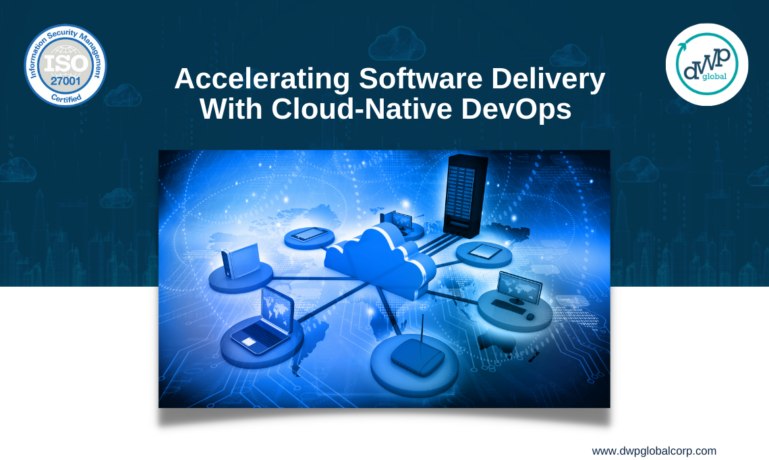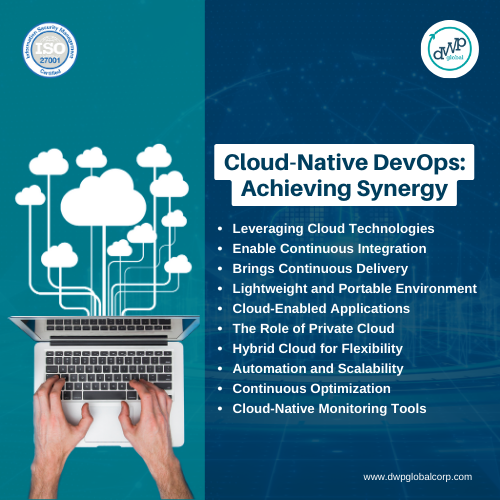- By: Admin
- September 20, 2023
- 1764 views

In the fast-paced world of Software Development, agility, efficiency, and innovation is the holy grail. The software industry is transforming, and traditional development approaches are no longer sufficient to meet the demands of the modern digital landscape. Welcome to the era of Cloud-Native DevOps, a groundbreaking approach redefining how software is conceived, developed, and delivered. Picture a world where development and operations seamlessly collaborate, where Software Delivery is not just a process but an ongoing journey of evolution. In this blog, we’ll explore the exciting world of Cloud-Native DevOps, where the fusion of Cloud Computing and DevOps Services is transforming the landscape of Software Delivery.
Why Cloud-Native DevOps: A Synergy Of Excellence
Cloud-Native DevOps is a transformative approach to reshaping software development and delivery. It is the integration of Cloud-Native principles with DevOps practices. It leverages Cloud Technologies, fosters continuous collaboration, and promotes automation for faster and more efficient software deployment. This exploration delves into the core principles and benefits of Cloud-Native DevOps.
Leveraging Cloud Technologies
Cloud-Native DevOps is rooted in the power of Cloud technologies. Organizations can harness the Cloud’s scalability, flexibility, and cost-efficiency of the Cloud to accelerate the development and deployment of their software applications.
Enable Continuous Integration
Continuous Integration (CI) is at the core of Cloud-Native DevOps. Developers can continuously integrate code into a shared repository, fostering a culture of collaboration and ensuring that changes are integrated regularly.
Brings Continuous Delivery
In addition to Continuous Integration (CI), Cloud-Native DevOps encourages Continuous Delivery (CD), automating the entire process from code integration to testing to deployment; this results in shorter development cycles and quicker time-to-market.
Lightweight and Portable Environment
Cloud-Native DevOps encourages the utilization of lightweight and portable development environments, guaranteeing consistency between development and production environments and effectively mitigating the ‘it works on my machine’ problem.
Cloud-Enabled Applications
Cloud-Native DevOps empowers organizations to build and cloud-enable applications from the ground up. These applications can fully leverage the capabilities of the Cloud, including auto-scaling and high availability.
The Role of Private Cloud
While Public Cloud offers scalability, organizations with stringent security requirements can opt for a Private Cloud. It provides a controlled environment with enhanced security measures.

Hybrid Cloud for Flexibility
Hybrid Cloud setups integrate on-premises infrastructure (private Cloud or traditional data center) with Public Cloud resources. This flexibility allows organizations to tailor their Cloud strategy to their specific needs.
Automation and Scaling
Leveraging cloud-native services, Cloud-Native DevOps can automate repetitive tasks like provisioning, configuration management, and scaling. The iterative and automated process at the core of Cloud-Native DevOps ensures that development and operations teams work together seamlessly, making continuous improvement and efficient resource management a standard practice. This automation frees up valuable time for developers and operations teams.
Scalability for Varying Workload Demands
One of the most significant advantages of the Cloud is its scalability. Cloud-Native DevOps guarantees applications can effortlessly scale in response to changing workload demands, optimizing resource utilization.
Continuous Optimization and Real-Time Insights
Cloud-Native DevOps fosters a culture of Continuous Optimization. Organizations can analyze real-time data and performance metrics, enabling informed decisions for improved operational efficiency.
Cloud-Native Monitoring Tools
Cloud-Native Monitoring Tools provide real-time insights into application performance, resource utilization, and user behavior. These tools are instrumental in maintaining the health and reliability of Cloud-Native applications. Some widely used examples are Prometheus, known for its open-source flexibility; Grafana, favored for its user-friendly dashboards; and Datadog, recognized for its comprehensive observability solutions, making them top choices in cloud-native environments.
The Potential Of Cloud-Native DevOps
In today’s dynamic digital landscape characterized by constant innovation and rapid evolution, Cloud-Native DevOps stands out as a powerful agent of transformation. It bridges the gap between development and operational teams, fostering a culture of collaboration, agility, and Continuous improvement. From its foundation in Cloud technologies to its embrace of DevOps practices, Cloud-Native DevOps offers a roadmap to accelerate software delivery.
This journey involves leveraging the power of the Cloud, adopting Continuous Integration and Continuous Delivery, and embracing a culture of automation and optimization. Whether it is a Private Cloud, a Hybrid Cloud, or a fully Public Cloud environment, Cloud-Native DevOps empowers organizations to thrive in the digital age.
Embrace Cloud-Native DevOps For Innovation
As technology continues to evolve, embracing innovation becomes non-negotiable. Cloud-Native DevOps isn’t just a methodology; it’s a path to faster, more efficient software delivery. Dive into Cloud Computing and DevOps Services, explore DevOps Consulting Services and Solutions, and consider Enterprise Cloud Services to spearhead your organization’s digital transformation. Witness how the synergy between Cloud and DevOps can fuel innovation, accelerating the Software Delivery process.
Your journey toward a brighter digital future starts now. Are you ready to embrace it?

